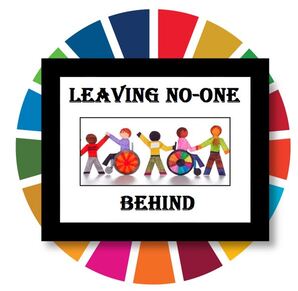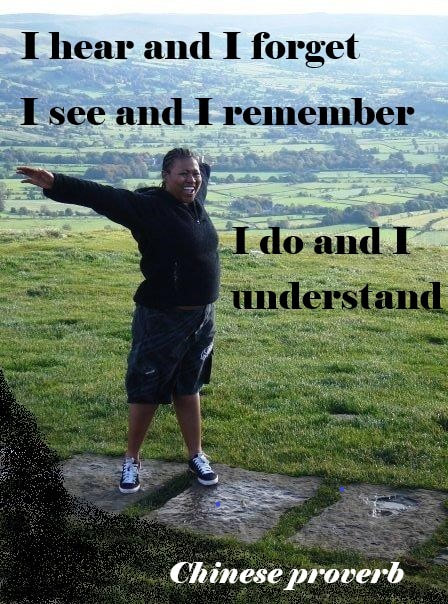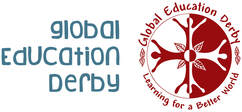How can Global Citizenship Education help ALL students fulfil their potential?
Global Citizenship Education covers a very broad remit, from human rights to sustainable living, through to conflict resolution and intercultural understanding, to name a few key concepts. At the heart is the recognition that interdependence binds the people of the earth together, across all forms of diversity and apparent differences, and often this awareness comes from exploring and understanding our own identity and reliance on the world around us. This interdependence is echoed in a commitment to providing an inclusive education. Watch the video, introducing the UNESCO Global Education Monitoring Report 2020 on Inclusion and Education.
Starting with the individual, learning to understand their unique perspectives and strengths, is key to supporting young people to find their place in the world. If we want young people to mature into respectful, thoughtful and considerate human beings, they need to have a growing knowledge of their local and national community and the wider world around them. This applies to everyone. A young person with an additional need shouldn’t be held back from discovering the world around them. The outside world is to be embraced and shared with them sensitively, in a way that is valuable to the individual student. Active, practical lessons and experiences will allow the students to appreciate and understand the world we share.
Giving young people the knowledge, skills and attitudes to engage confidently with their environment is paramount for all students, including special educational needs and disability (SEND) and minority groups at risk of marginalisation. A global learning curriculum provides a toolkit of skills for young people to begin to believe in themselves and others, feel able to try new things and voice their opinions. Developing the confidence, resilience and responsibility to make the most of individual abilities is surely what education is about for everyone. What do you consider the purpose of education is?
A logical and sequential curriculum is needed to provide young people with the breadth of understanding and knowledge to become active citizens in their own community. Accessing real life experiences is important to develop skills, promoting positive attitudes that, in turn, empower informed, responsible citizens. Global themes can be threaded through every curriculum area, relating learning to real life situations. This, in turn, helps young people see the value in learning and what it could look like in their own lives.
Young people often feel that decisions are made by others and that their views are dismissed and not valued by adults. In this scenario, how are they going to develop the confidence to think critically, creatively and shape their own futures?
SEND students are capable of whatever they put their minds to do and their opinions and views should be valued. It is important to give students a voice, allowing them to lead on issues important to them through real life experience. Educators have a unique privilege to facilitate this process within a safe, supportive environment.
A successful global curriculum is student-led, centred on the students interests and what is happening in the world around them at the present time. The importance of looking at historical issues and their ongoing impact, even centuries later, can also help educate for the future and encourage young people to reflect and take care of themselves and others.
A global curriculum can be linked to the 17 Sustainable Development Goals, ensuring that current issues are at the forefront in the teaching of global citizenship. This keeps the curriculum relevant and ensures that young people have an understanding of the changing world around them. Exploring the Sustainable Development Goals encourages young people to take an active role as a global citizen.
Global Citizenship Education embedded within a curriculum equips learners to develop their understanding and knowledge of democracy, economy and law, through participating and engaging with others in discussions, debates, volunteering, raising awareness and contributing to improving the local community. There are a multitude of ways young people can make their voices heard, deepen knowledge and collaborate with others to take steps towards a fairer, more equitable society. Global learning provides a gateway to rehearse and extend these skills progressively, through a well-designed global curriculum offer.
Further reading:
Education for Global Citizenship - A Guide for Schools (Oxfam) - edu-global-citizenship-schools-guide-091115-en.pdf (openrepository.com)
The ABCs of Global Citizenship Education (UNESCO) - Global citizenship education: topics and learning objectives - UNESCO Digital Library
Global Citizenship Education: Topics and learning objectives (UNESCO) - Global citizenship education: topics and learning objectives - UNESCO Digital Library
Special Educational Needs in Mainstream Schools: Five recommendations on special education needs in mainstream schools - educationendowmentfoundation.org.uk/education-evidence/guidance-reports/send
Inclusion in education: Leaving no learner behind - www.unesco.org/en/education/inclusion
Education for Global Citizenship - A Guide for Schools (Oxfam) - edu-global-citizenship-schools-guide-091115-en.pdf (openrepository.com)
The ABCs of Global Citizenship Education (UNESCO) - Global citizenship education: topics and learning objectives - UNESCO Digital Library
Global Citizenship Education: Topics and learning objectives (UNESCO) - Global citizenship education: topics and learning objectives - UNESCO Digital Library
Special Educational Needs in Mainstream Schools: Five recommendations on special education needs in mainstream schools - educationendowmentfoundation.org.uk/education-evidence/guidance-reports/send
Inclusion in education: Leaving no learner behind - www.unesco.org/en/education/inclusion




